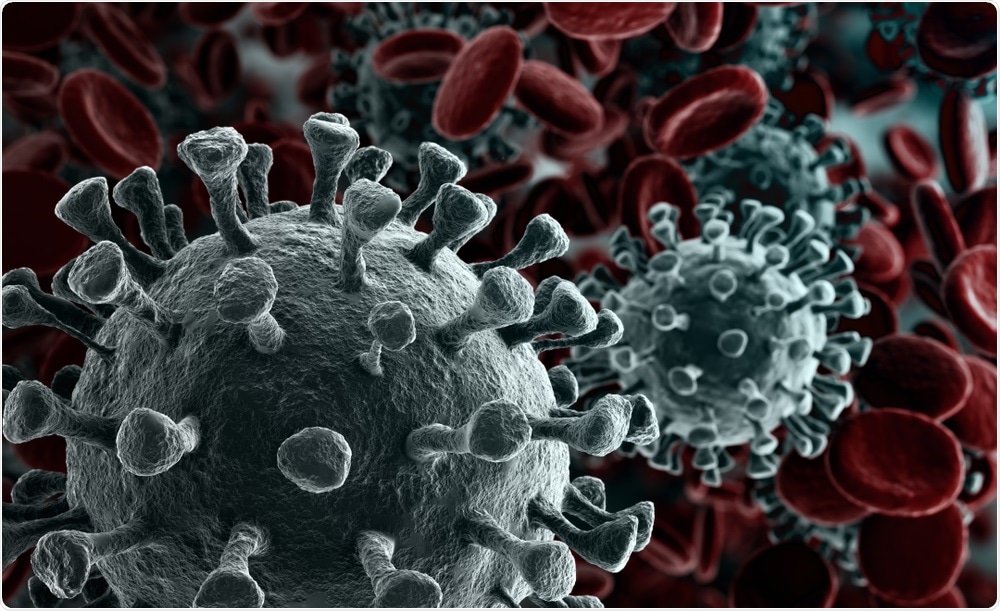A new study has shown that a new DNA-based coronavirus disease 2019 (COVID-19) vaccine successfully induced immunization against severe acute respiratory syndrome coronavirus 2 (SARS-CoV-2) in mice and hamsters, indicating that other vaccine types may also be effective in addressing the COVID-19 pandemic.

COVID-19. Image Credit: creativeneko/Shutterstock.com
A different approach to vaccinating against the SARS-CoV-2 virus
In response to the SARS-CoV-2 pandemic, researchers have developed a new vaccine relying on nucleic acids containing the spike gene delivered via electroporation.
Vaccines currently rely on mRNA strands to induce immunization against the SARS-CoV-2 virus. However, clinical research has recently developed effective DNA vaccines to treat infections including HIV-1, Ebola, influenza, and Zika virus. However, new findings published in PLOS Neglected Tropical Diseases have reported the successful development of a vaccine using the virus’ DNA encoding the spike protein, suggesting that DNA vaccination could be a promising alternative for larger-scale protecting against COVID-19.
The reasoning to diverge from traditional mRNA vaccines is due to the fact that although the DNA and mRNA vaccines both utilize the genetic material of the virus to induce an immune response, mRNA vaccines are more expensive and take longer to be produced and transported in comparison to its counterpart. Moreover, in the case of SARS-COV2, DNA vaccines do not require storage in cold temperatures, providing a solution to some of the storage-related issues current vaccination systems are encountering.
Improving vaccine transportation and long-lasting effectiveness
In a new study published by Shih-Jen Liu and Hsin-Wei Chen of the National Health Research Institute, Taiwan, and their colleagues, researchers were able to develop a vaccine using the DNA encoding the SARS-CoV-2 spike protein to develop an effective DNA vaccine. This spike protein is the coronavirus surface protein that is responsible for the processes of virus attachment to the host receptor, cell entry, and cell fusion, making it a key target for current vaccines.
The researchers were also able to overcome the challenge of delivering the DNA often seen in DNA vaccines by coupling the vaccine with electroporation, a physical method of increasing the permeability of the cell membrane by using electrical fields. This transportation method was previously used when treating the Zika virus, enhancing the effectiveness of vaccines.
In this study, researchers demonstrated that the DNA vaccine coupled with electroporation immunized both mice and hamsters, with individuals developing long-lasting antibodies against the SARS-CoV-2 spike protein even after 20 weeks post-immunization. After two immunizations at a 3-week interval, hamsters exposed to COVID-19 after 7 weeks showed no loss of body weight and a reduction in viral RNA in their lungs in comparison to non-immunized individuals.
The DNA vaccine is thermal stable which is no cold chain-needed and can induce a high level of long-lasting neutralizing antibody titers against SARS-CoV-2. The DNA vaccine confers protective efficacy against SARS-CoV-2 infection in Syrian hamsters which is a severe COVID-19 disease animal model.”
The authors concluded by suggesting further trials using the DNA vaccine for SARS-CoV-2 on other mammalian species and using other methods for vaccination delivery and transportation could be conducted. For instance, intradermal (ID) injection, which is more convenient for clinical application, can affect more tissues than intramuscular injection.
Additionally, vaccine efficacy should be tested in aged individuals as a model for elderly humans, which represents a population that is particularly severely affected when infected by SARS-CoV-2.
Future studies could also consider the side effects of the SARS-CoV-2 DNA vaccine, which has been reported as comparatively less severe relative to current mRNA vaccines, further supporting its potential to addressing the COVID-19 pandemic.
Journal reference:
- Chai KM, Tzeng T-T, Shen K-Y, Liao H-C, Lin J-J, Chen M-Y, et al. (2021) DNA vaccination induced protective immunity against SARS CoV-2 infection in hamsters. PLoS Negl Trop Dis 15(5): e0009374. https://doi.org/10.1371/journal.pntd.0009374